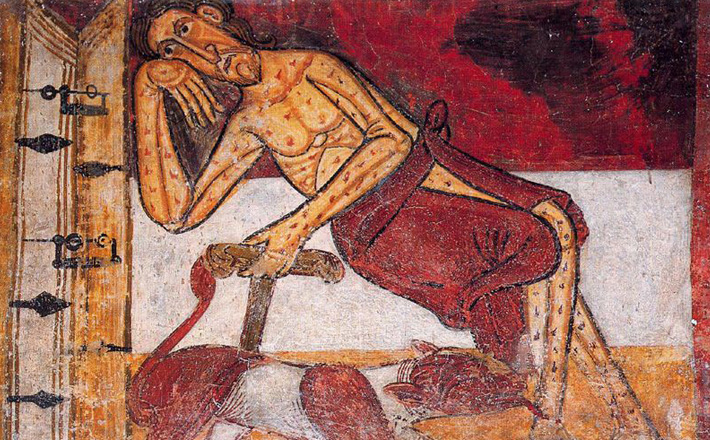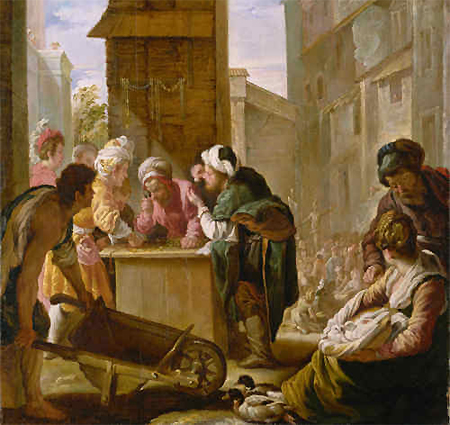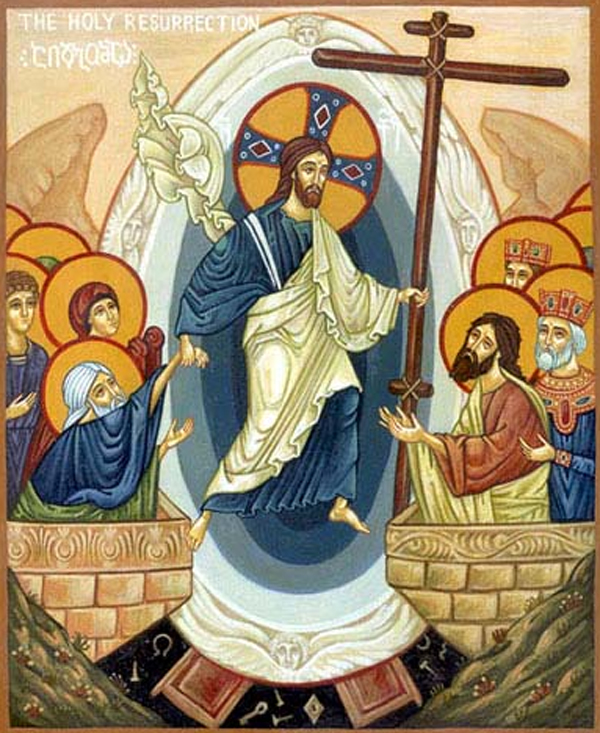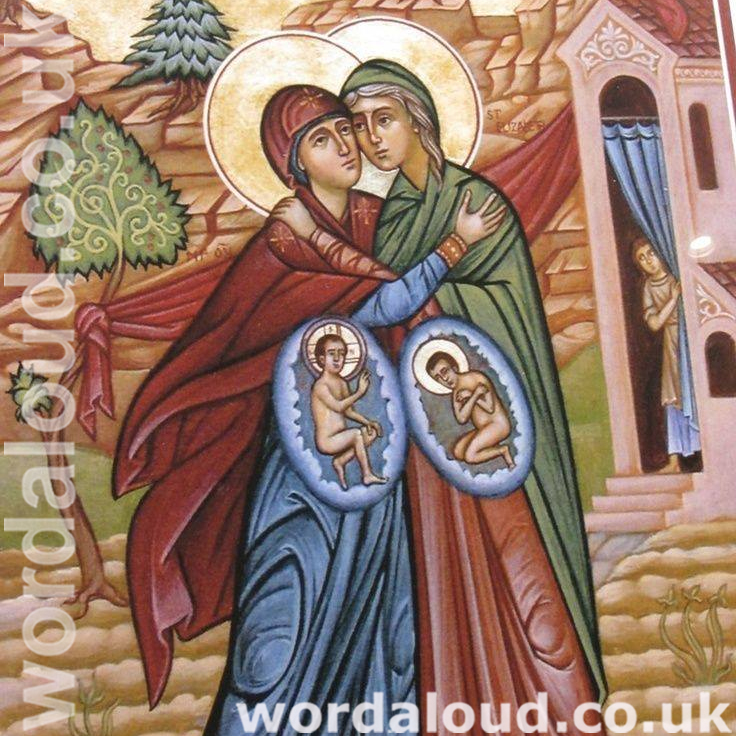Christian Art | Parable Of Lazarus And The Rich Man
Luke 16: 19-31 – Lent Week 2, Thursday (Audio Bible KJV, Spoken Word)
19 ¶ There was a certain rich man, which was clothed in purple and fine linen, and fared sumptuously every day:
20 And there was a certain beggar named Lazarus, which was laid at his gate, full of sores,
21 And desiring to be fed with the crumbs which fell from the rich man’s table: moreover the dogs came and licked his sores.
22 And it came to pass, that the beggar died, and was carried by the angels into Abraham’s bosom: the rich man also died, and was buried;
23 And in hell he lift up his eyes, being in torments, and seeth Abraham afar off, and Lazarus in his bosom.
24 And he cried and said, Father Abraham, have mercy on me, and send Lazarus, that he may dip the tip of his finger in water, and cool my tongue; for I am tormented in this flame.
25 But Abraham said, Son, remember that thou in thy lifetime receivedst thy good things, and likewise Lazarus evil things: but now he is comforted, and thou art tormented.
26 And beside all this, between us and you there is a great gulf fixed: so that they which would pass from hence to you cannot; neither can they pass to us, that would come from thence.
27 Then he said, I pray thee therefore, father, that thou wouldest send him to my father’s house:
28 For I have five brethren; that he may testify unto them, lest they also come into this place of torment.
29 Abraham saith unto him, They have Moses and the prophets; let them hear them.
30 And he said, Nay, father Abraham: but if one went unto them from the dead, they will repent.
31 And he said unto him, If they hear not Moses and the prophets, neither will they be persuaded, though one rose from the dead.
Jesus speaks in parables when he has something important to communicate. The meaning of a parable may seem obscure or in need of explanation. Jesus does give interpretations of the parables to his disciples. We are encouraged through the parables to see our world in new and perhaps unexpected ways. The parables encourage us to think more deeply about Jesus’ teaching. They are, above all, a challenge – even an anarchic challenge – to everything we think we know.
In the parable of Lazarus and the rich man, there are three persons: the poor Lazarus, the rich man without a name, and Father Abraham. In the parable, Abraham represents the will of God. The rich man represents those who have power in the world, in terms of worldly ideologies centred on worldly riches. Lazarus represents the cry of the poor, the needy, the excluded, whose voice may not be heard in our world and whose needs and basic human dignity may not be recognised.
We are assured in the parable of the immortality of the soul and of reward or retribution in the next life. We are also assured of judgement immediately after death, after which no further penitence is possible. It is while Lazarus is begging at his gate that for the rich man there is a possibility of redemption. Lazarus, in the parable, is the rich man’s only possibility of redemption. Once Lazarus has died, the rich man cannot help himself. As Jesus will say: ‘For I was an hungred, and ye gave me no meat: I was thirsty, and ye gave me no drink.’ So he dies, his opportunity gone from him.
Earthly possessions, and earthly suffering, are transient things. It is only when the rich man has died that he sees the truth. Then he sees what is truly of value. Lazarus is in the bosom of Abraham. He is at home. He is blessed. The rich man cries for mercy, and for what must have once been so little but has now become so much: a drop of water. He cries for Lazarus, the person he now sees is his only possible benefactor. But now this is impossible. ‘A great gulf is fixed.’ There can be no more passage from sin through penitence.
While he has never been concerned for the poor, the rich man is concerned for his brothers. He begs that they be warned, and by Lazarus. Yet he is told, they have the Old Law, they have Moses and the prophets. Let them discover justice, mercy and love in the Old Testament. Moreover, so Abraham says, if they will not listen to Moses and the prophets, then they won’t be convinced even if someone rises from the dead to show them what’s right!
The parable, then, warns us to listen to Jesus, to see the poor and the needy when they sit at our gates, to help them. We are called to see Jesus in all our fellow human beings, especially those who are most in need of what we can give. We are taught to see beyond the social scheme of things, to turn such sets of value upside down. We are taught to fear God and follow the Scriptures.
‘All our fear of God is inspired by love; perfect love of God makes fear perfect. We show our love of God especially when we follow his advice, conform to his laws and trust in his promises.’ St Hilary
Audio Bible KJV | Endnotes
The Parable Of Lazarus And The Rich Man Anticipates The Cross
As through crucifixion Jesus becomes on the Cross a sign of utmost poverty, indeed scandalous suffering, as God The Son is rendered abject and becomes a dead human corpse, so it is fitting that in the Lenten journey we reflect upon the parable. The rich man is condemned and goes to hell. Must it seem to us a clear implication of the story that Lazarus the poor man dies and goes to heaven – to the bosom of Abraham? His very abject poverty seems the gateway to eternal life.
An interpretation of the parable is that it is a warning about the dangers of wealth and the importance of caring for the poor. As St. Ambrose, the 4th century bishop of Milan, wrote: ‘The rich man is condemned not for having riches, but for not using them well.’ (Exposition of the Gospel of Luke, Book VII)
This interpretation is supported by Jesus’ teaching throughout the Gospels, where he emphasizes the importance of caring for the poor and the marginalized. In Matthew 25:31-46, for example, Jesus says that the righteous will be welcomed into eternal life because ‘I was hungry and you gave me food, I was thirsty and you gave me drink, I was a stranger and you welcomed me’ (Matthew 25:35, NRSV). By contrast, those who fail to care for the poor are condemned to eternal punishment: ‘Depart from me, you cursed, into the eternal fire prepared for the devil and his angels.’ (Matthew 25:41, NRSV)
Moreover, the story of the rich man and Lazarus can be seen as a critique of the religious elite of Jesus’ time, who were often wealthy and who looked down on the poor. As Bishop Robert Barron notes: ‘The Pharisees were a wealthy and influential class within Israel, and the story of Lazarus and the rich man is, in part, a critique of them.’ (Word on Fire Bible, Volume 3: Luke) By contrasting the fate of the rich man with that of Lazarus, Jesus may be suggesting that the Pharisees’ focus on material consideration, figured as wealth, and their disregard for the poor, as for spiritual poverty, would ultimately lead to their own condemnation – to hell.
The parable is a commentary on the afterlife, Abraham’s bosom being a place of comfort and rest for the faithful, and Hades (hell) being a place of torment for the unrepentant. As the Catechism of the Catholic Church states: ‘The souls of the righteous are in the hands of God, and no torment will ever touch them.’ (CCC 1023) Conversely, those who reject God’s mercy and refuse to repent are subject to eternal punishment: ‘They will suffer the punishment of eternal destruction, away from the presence of the Lord and from the glory of his might.’ (2 Thessalonians 1:9, NRSV)
And the story of the rich man and Lazarus is understood as a call to social justice and the importance of caring for the marginalized and oppressed. As the Catholic social teaching document Gaudium Et Spes states: ‘The joys and the hopes, the griefs and the anxieties of the men of this age, especially those who are poor or in any way afflicted, these are the joys and hopes, the griefs and anxieties of the followers of Christ’. (GS 1) The story of the rich man and Lazarus invites us to reflect on our own lives and to work for a more just and equitable world, where all people are treated with dignity and respect.
Crucifixion Of Jesus | Life Through Death In Poverty
The parable of the rich man and Lazarus can be understood as prefiguration of the crucifixion of Jesus Christ. Both the rich man and Jesus die and suffer hell, but their suffering has different meanings and outcomes. The rich man suffers because of his sin and his disregard for the poor, while Jesus suffers because of his love for humanity and his willingness to take on the sins of the world. As St. Augustine wrote: ‘The rich man in the parable was in hell because he loved himself more than his neighbour, while Christ on the cross was there because he loved us more than himself.’ (Sermon 18 on the New Testament)
Moreover, the story of the rich man and Lazarus can help Christians to understand the meaning of the crucifixion in a deeper way. Just as the rich man was separated from Lazarus by a great chasm, so too sin creates a separation between humanity and God that cannot be bridged by our own efforts. It is only through the sacrificial love of Jesus Christ that we are able to be reconciled with God and to enter into eternal life. As St. Paul wrote: ‘God shows his love for us in that while we were still sinners, Christ died for us.’ (Romans 5:8, ESV).
Finally, the story of the rich man and Lazarus can inspire us to follow in the footsteps of Jesus by embracing the way of the Cross. Just as Jesus willingly accepted suffering and death in order to save humanity, so too we are called to take up our own crosses and to follow him. As St. Francis de Sales wrote: ‘Let us embrace the Cross, and we shall find it a ladder to heaven.’ (Introduction To The Devout Life) By embracing the poverty and humility of Christ on the Cross, we are enabled to become more fully united with him and with all of humanity, and thus enter into the fullness of eternal life.








